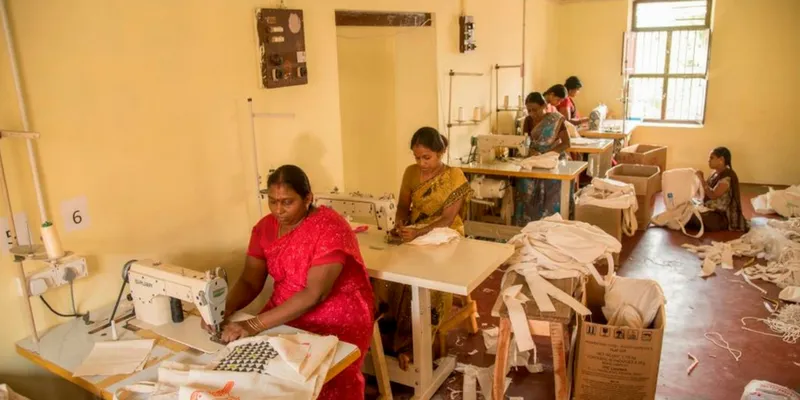This Madurai couple is reviving the 'carry your own bag' culture with its eco-friendly bags
Krishnan Subramanian and Gowri R G started ‘The Yellow Bag’ with a mission to create economic and practical alternate products to replace use-and-throw products

Plastic, many say, is more of a bane than a boon. Single-use plastic is the cause for more damage to the environment than any other man-made invention today. Right from its manufacture to disposal, both through incineration and in landfills, plastic pollutes the air, land and water, exposes workers to toxic chemicals, and releases carcinogens into the environment.
Looking to find an alternative to plastic carry bags, Krishnan and Gowri from Madurai started The Yellow Bag to revive the habit of 'carrying your own bag'.
Reducing Plastic Pollution
“At a point while living in Chennai, we felt that we are part of the problem even after knowing the potential impact that our consumption pattern has on earth as an ecosystem. We wanted to do something about it. We networked with likeminded people, came to understand various initiatives and figured what to do,” says Krishnan.
The birth of their daughter in 2010 changed their perspective towards life, and the couple wanted to do good for future generations. As a first step to change the current unsustainable way of living, they started The Yellow Bag in 2014.

The Yellow Bag makes cotton cloth bags, and packaging pouches, customising the fabric, bag dimensions and prints to suit client requirements. The products come at a starting price as low as Rs 4 per bag.
Deciding to dedicate more time to the initiative, the couple quit their jobs in Chennai and moved to their hometown of Madurai in June2015. They now work with women’s groups in villages, and few small enterprises, to make the cloth bags better and cheaper.
Our bags are widely preferred by event managers as promotional bags, by shops at check-out points, and exporters to sell to foreign markets. Product manufacturers use our bags for packing. Our clients are as large as someone who needs 30,000 bags, to someone who just needs 30 bags for a kids’ birthday party, says Krishnan.
Challenges of going eco-friendly
“When we started, we couldn’t get experienced tailors to make cloth bags. Most of them had moved away from cloth, and were occupied in making non-woven bags, which are made of synthetic fabric and plastic, generally given away in garment shops. We had to ask them to move to stitching cloth bags and also train new tailors,” says Krishnan.

While getting people to take to eco-friendly bags and manufacturing them were hurdles that Krishnan and Gowri had anticipated, another challenge was convincing people to use natural cotton coloured bags, as against dyed or coloured fabric.
We had to handle that pushback of not getting impressed with plain bags. We were quite insistent on not dyeing our bags, since dyeing the entire bag consumes more water. We, however, print the bags with logos and captions, says Krishnan.
The Yellow Bag sources fabric locally from in and around Madurai. The in-house unit cuts the fabric, prints on it, and distributes it to the network of women tailors. They stitch the bags and send it back, after which a quality check is done before dispatching to the customers.

In this process, the market risk in absorbed by us (TheYellowBag) and the women involved gain decent employment. We are a large family now. We are also a large group of micro-entrepreneurs than a group of salaried staff. We have 15 people in our central production centre and another 25 women tailors in the network, says Krishnan.
Spreading the message
The Yellow Bag’s revenue has grown 300 percent year-on-year for the last two years. From just the two of them in 2014, Krishnan and Gowri now have a workforce of 15 people under one roof and an extended family of additional 25 people. On an average, The Yellow Bag makes around 1,000 bags a day, with plans to take it up to 3,000 a day soon.

“Although a not a lot of supermarkets are currently on board, corporate customers are repeat buyers. Our first ten corporate customers are still with us. Some of them have yearly events. They come to us every year or time depending on their requirement. However, our regular customers are mostly organic stores and boutique stores,” says Krishna.
They have worked with more than 500 customers so far, and Krishnan and Gowri also conduct awareness discussions with students and communities of all age groups to spread the message.
After the couple came up with the idea of manufacturing affordable cloth bags, they launched the concept of Plastic Bootham (Plastic Monster Costume) and in July 2015, and authored a Tamil book “NegizhiBootham”, a small book detailing the problem with plastic that our environment faces.

In July 2016, they established two urban cloth bag tailoring clusters enabling a speech and hearing impaired couple to print on cloth bags and train five mentally challenged women to work on tailoring the cloth bags.







